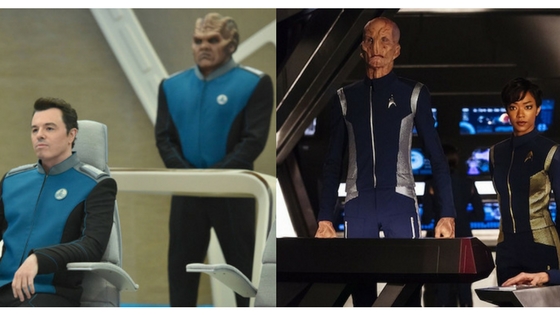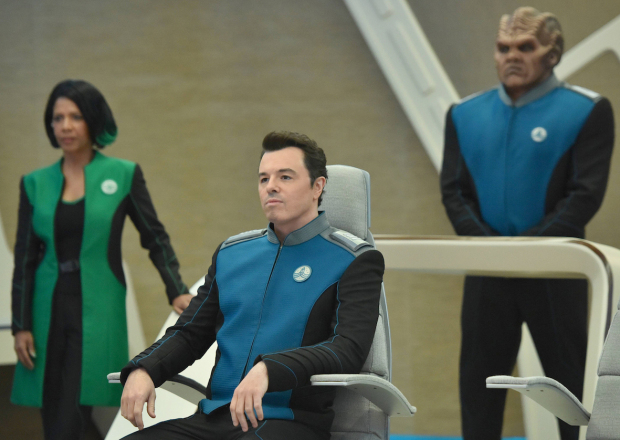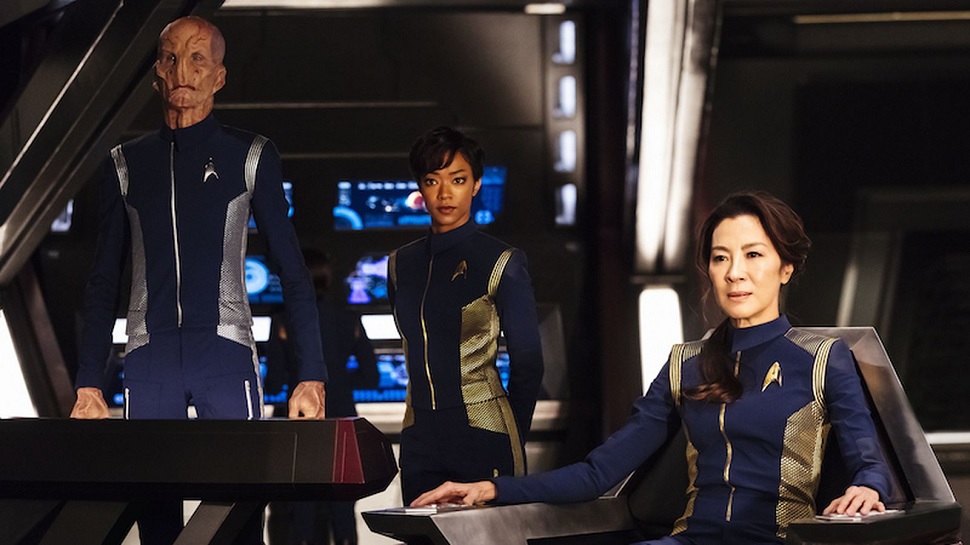 September of 2017 was a pretty interesting month for space opera. Two major networks, Fox and CBS, each rolled out a new big-budget science fiction series. The first, The Orville, is the brain-child of Family Guy and American Dad! creator Seth MacFarlane. The second, Star Trek: Discovery, is helmed by a mix of Trek veterans and newcomers, most notably Alex Kurtzman, part of the team behind the Star Trek reboots.
September of 2017 was a pretty interesting month for space opera. Two major networks, Fox and CBS, each rolled out a new big-budget science fiction series. The first, The Orville, is the brain-child of Family Guy and American Dad! creator Seth MacFarlane. The second, Star Trek: Discovery, is helmed by a mix of Trek veterans and newcomers, most notably Alex Kurtzman, part of the team behind the Star Trek reboots.
I watched the pilot episode for both shows. Now, it could be argued that pilots tell you nothing and everything. On one hand, they’re the first try of a show, and first tries can be shaky, even for the best of series. Star Trek: The Next Generation, one of the most beloved of the Star Trek franchises, was decent but not great in its maiden episode, “Encounter at Farpoint.” So it’s treacherous to speculate too deeply on a show’s potential based on the first installment.
At the same time, though, a pilot episode casts a vision that guides the rest of the series. The tone and vibe you see in the first episode is liable to be what you see in the last episode. What you see from The Orville and Star Trek: Discovery in the first ten minutes is what you’ll probably see a lot of later on.
What I saw, in both cases, was heartbreak … but for vastly different reasons.
Let’s look at each show in turn.
The Orville
 By most accounts, Fox botched the pre-release marketing for this show. The early trailers gave the impression that the show was some sort of space parody, like Galaxy Quest. But as the show’s season premiere date drew closer, early reviews revealed something altogether different. One part comedy, one part drama, and several parts space opera, we were told that, in fact, The Orville was an earnest homage to the likes of Star Trek: The Next Generation, despite the showrunner’s repeated declaration that the show was not an homage to Star Trek. The majority of the early reviews were positively devastating in their critiques — a cumulative 20% on Rotten Tomatoes — with a minority arguing that the show was every bit the fun Next Generation was in the 1980s.
By most accounts, Fox botched the pre-release marketing for this show. The early trailers gave the impression that the show was some sort of space parody, like Galaxy Quest. But as the show’s season premiere date drew closer, early reviews revealed something altogether different. One part comedy, one part drama, and several parts space opera, we were told that, in fact, The Orville was an earnest homage to the likes of Star Trek: The Next Generation, despite the showrunner’s repeated declaration that the show was not an homage to Star Trek. The majority of the early reviews were positively devastating in their critiques — a cumulative 20% on Rotten Tomatoes — with a minority arguing that the show was every bit the fun Next Generation was in the 1980s.
After watching the pilot, I had a hard time disagreeing with the majority.
Now, a disclaimer: I’m not a fan of MacFarlane, Family Guy, or American Dad! More than a few people have told me that you have to like MacFarlane’s humor to like The Orville. I don’t like MacFarlane’s humor. I do like Star Trek … and The Orville, in my own opinion, is no Star Trek.
On paper, the pieces should be there: a colorful, diverse cast of characters (including an everyman captain), a world with lots of room to grow, and a pretty good special effects budget. MacFarlane, a reputed Star Trek geek, put great care into everything from the uniforms to the full model of the show’s titular ship, which is used in scenes that don’t require CGI.
But the sum is, in my view, far less than the sum of its parts, in large part because none of the show’s component pieces work very well. The characters in the pilot come off as one dimensional, the plotlines are thinner than they appear to be, and some of the technical elements of the sci-fi world — the stuff sci-fi geeks can’t get enough of — are basically window dressing. (I don’t actually know what kind of pistol Captain Ed Mercer is shooting, for example.)
But the worst part is the humor. It’s not just that it’s crude: it’s that it’s middle-school-intelligence crude. We get our first lazy attempt at a male anatomy joke ten minutes in, and from there on out that batting average for the jokes is maybe 25%. The humor makes the show dumber, not smarter, and very little of it would have been seen on the far side of even the cheesiest 1960s Star Trek episode, much less Galaxy Quest. There’s not much in the way of wit or charm. (As an added bonus, the show’s crude humor makes it less suitable for younger audiences than Star Trek: The Next Generation or Galaxy Quest.)
It’s a real disappointment for me, because I had hopes that this show would be something worth watching and maybe laughing at.
Star Trek: Discovery

If The Orville‘s marketing was guilty of being misleading, Star Trek: Discovery was guilty of being almost too secretive. CBS showed very little of the show beyond a few scattered clips, and even then left a lot of questions. For example, most of the trailers featured action on board the Shenzhou … which is not the Discovery. The Discovery, we know, eventually becomes the main focus of the show, but we don’t know how we get from Michelle Yeoh as captain to Jason Isaacs.
There wasn’t a lot in the way of early advance reviews, but as the pilot rolled out, critics’ views followed. In general, they were substantially better than The Orville, accounting for a composite 85% score on Rotten Tomatoes. Fan views were also generally positive, although more than a few Star Trek purists took issue with the way the show seemed to bend (if not break) continuity with other Star Trek installments in terms of the slickness of the technology compared to the 1960s show, as well as in its depiction of the Klingons. Discovery is, after all, set ten years before Kirk.
This is an instance where, by and large, I side with the critics. It took all of about five minutes for me to see that the show was not only potentially special, but also cerebral. I can’t overstate the importance of that second part: one of the criticisms of the J.J. Abrams Star Trek reboots of the 2000s and 2010s is that they lacked the intelligence and high ideas that had so marked the series up to that point, opting instead for style and action. But it was obvious from the get-go that Discovery was smart, opening with a conversation on a desolate world that included wit, ethical considerations, and hypotheticals. The rest of the first hour was an exercise in everything I like about Trek, with interesting characters, epic scenes, dramatic tension, tactical strategy, politics and religion … and just the right amount of humor.
With regard to purist criticisms: I understand them, but I would also add that Star Trek has sometimes played loose with continuity. The Klingons underwent changes in the Trek films that we all knew to be due to increased budget, and while the differences between Original Series and later Klingons was cleverly explained by Deep Space Nine and later Enterprise, those were solutions served up to a problem, not an existing premise in the series. Add into that the myriad of other unexplained artistic and special effects differences through the series — a ship’s phaser in The Wrath of Khan looks nothing like the shows before or after, and don’t get me started on the special effects of Star Trek V — and it becomes clear that continuity is not always as cut-and-dry in Trek as we’d like it to be. Everything in Star Trek from Enterprise onto the reboots feels more like a visual retcon than a continuation. Some will hate it and some will be okay with it. I’m okay with it.
So, you might wonder, where’s the heartbreak with Discovery? The answer to that is CBS All Access. CBS has decided that Discovery will be the fuel that powers subscribers to its streaming service. (Well, that’s true if you’re in the United States. Other places will get the show on Netflix.) According to CBS, Discovery has resulted in record signup numbers for the service … something that runs $5.99 with commercials and $9.99 without. But that’s a lot if the only thing you really care about on the service is one show.
So I’m left with two shows: one of them that I dislike but is readily available, and one of them I like but is behind a paywall.
For now, sadly, that means my viewing time will involve neither.



